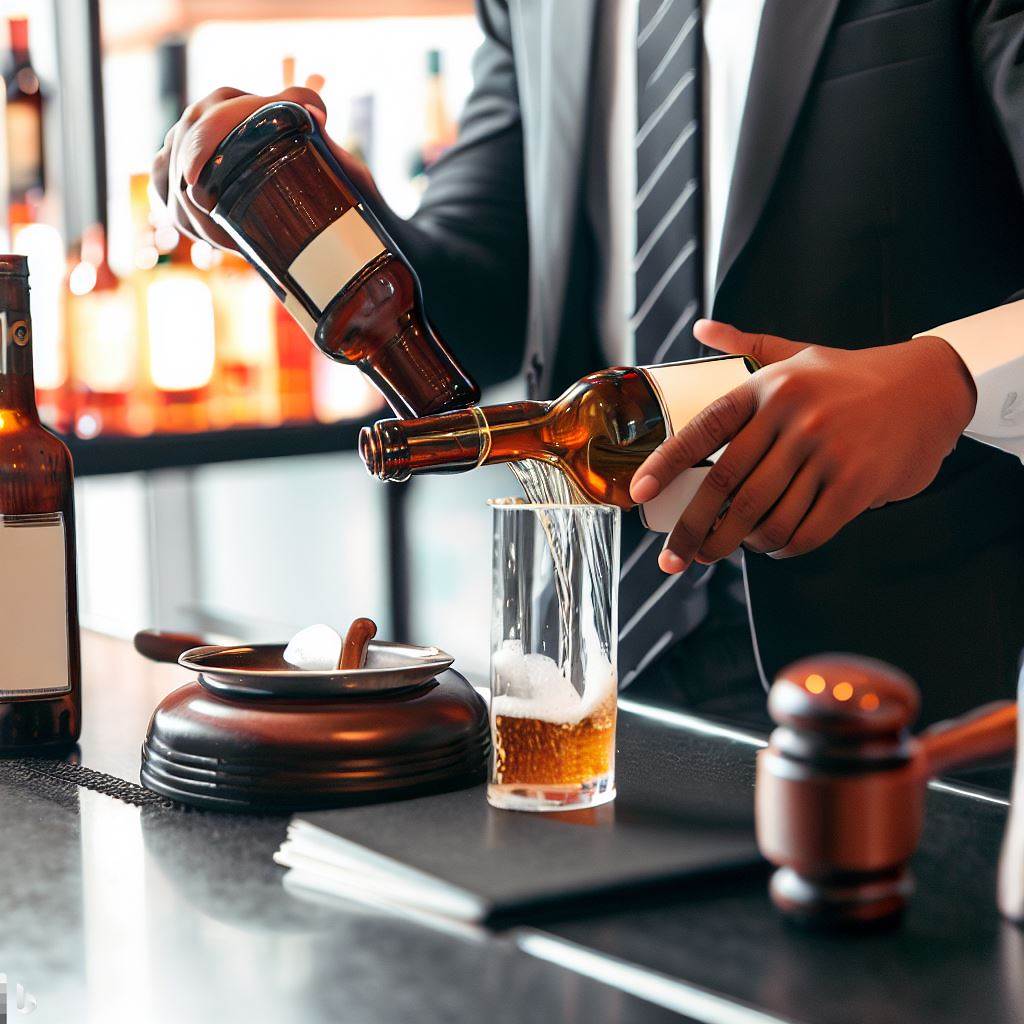Introduction
In Nigeria, bartending is a prevalent profession, making it essential for both job seekers and employers to comprehend bartender salaries.
Understanding bartender salaries in Nigeria serves a twofold purpose.
Firstly, it ensures fair compensation for bartenders, recognizing their valuable role in the hospitality industry.
Fair wages not only motivate existing bartenders but also attract skilled professionals, promoting excellence in the field.
Secondly, it benefits employers by allowing them to offer competitive compensation packages.
When employers have a clear grasp of prevailing salary ranges, they can attract and retain top talent, ultimately enhancing the quality of service and customer satisfaction in their establishments.
In summary, having a comprehensive understanding of bartender salaries in Nigeria is pivotal for fostering a thriving and well-compensated bartender workforce while also improving the overall quality of service in the hospitality sector.
Overview of Bartending in Nigeria
A. Explanation of the bartending profession
Bartending is the art and skill of preparing and serving alcoholic beverages to customers in bars, pubs, or restaurants.
Bartenders are responsible for creating a welcoming atmosphere, taking orders, mixing and serving drinks, and handling cash transactions.
They must also possess excellent interpersonal and communication skills to interact with customers and provide exceptional service.
B. Growth of the hospitality industry in Nigeria
The hospitality industry in Nigeria has experienced significant growth in recent years.
With a thriving economy and increasing tourism, the demand for hospitality services, including bartending, has skyrocketed.
Hotels, restaurants, and bars are constantly looking for skilled bartenders to enhance their customers’ experience and boost their revenue.
C. Increasing demand for bartenders in the country
Nigeria’s rapidly growing population and changing lifestyle have contributed to the increasing demand for bartenders.
Socializing and entertainment have become an integral part of the Nigerian culture, leading to a rise in the number of bars and nightclubs.
As a result, bartenders are sought after to meet the needs of the expanding nightlife scene.
Besides nightlife, bartenders are also in demand for events such as weddings, parties, and corporate functions.
Overall, bartending in Nigeria is a thriving profession with a promising future.
The growth of the hospitality industry and the increasing demand for bartenders offer excellent opportunities for career advancement and financial stability.
Factors Affecting Bartender Salaries in Nigeria
In Nigeria, several factors play a crucial role in determining the salaries of bartenders.
Understanding these factors is essential for both aspiring bartenders and employers in the hospitality industry.
This section explores the key elements that influence bartender salaries in Nigeria:
A. Location and Establishment Type
- Geographic location has a significant impact on bartender salaries. Bartenders working in major cities like Lagos and Abuja tend to earn higher wages compared to those in smaller towns.
- The type of establishment also affects a bartender’s salary. Bartenders working in high-end hotels, upscale bars, and exclusive clubs generally earn more than those employed in local pubs or casual restaurants.
B. Experience and Skills
- Bartenders with extensive experience in the industry usually command higher salaries. Employers often value seasoned professionals who can handle various customer demands efficiently.
- Specialized skills such as mixology expertise, knowledge of different spirits, and cocktail creations can significantly increase a bartender’s earning potential.
- Being bilingual or multilingual can also lead to higher salaries, especially in cosmopolitan areas with a diverse customer base.
C. Education and Formal Training
- While a formal education is not a strict requirement for bartending, possessing a relevant degree or certification can positively impact salary levels.
- Bartenders who have taken courses in hospitality management, mixology, or attended bartending schools often have an advantage over their counterparts.
- Holding certifications from recognized organizations like the National Bartenders Association demonstrates professionalism and can lead to better-paying positions.
D. Additional Responsibilities and Roles
- Bartenders who take on additional responsibilities such as managing inventory, training new staff, or overseeing bar operations may negotiate higher salaries.
- Senior bartender positions, such as head bartenders or bar managers, often come with higher salaries due to the increased level of responsibility and accountability.
- Bartenders who excel in customer service and actively contribute to enhancing the establishment’s overall experience might receive higher tips, resulting in higher overall earnings.
By considering these factors, both aspiring bartenders and employers can gain a better understanding of what influences bartender salaries in Nigeria.
It is essential to assess the local market, consider additional qualifications, and recognize the value of experience and skills in negotiating fair compensation for this vital role in the hospitality industry.
Average Salary Range for Bartenders in Nigeria
A. Minimum wage for bartenders
The minimum wage for bartenders in Nigeria is determined by the National Minimum Wage Act.
This act ensures that workers, including bartenders, receive a fair and just wage for their services.
The current minimum wage in Nigeria is set at ₦30,000 per month, which is equivalent to around $75.
However, it is important to note that this minimum wage may vary depending on the establishment and location.
B. Average salaries in various cities
Bartenders in Lagos, the largest city in Nigeria, typically earn higher salaries compared to other cities.
In Lagos, the average salary for a bartender ranges from ₦50,000 to ₦100,000 per month.
In Abuja, the capital city, bartenders can expect to earn between ₦40,000 to ₦80,000 per month.
Now, in other major cities such as Port Harcourt and Kano, the salary range is slightly lower, around ₦30,000 to ₦60,000 per month.
C. Factors that may cause salary variations
Experience and skill level play a significant role in determining a bartender’s salary.
Bartenders with several years of experience and extensive knowledge of mixology tend to earn higher salaries.
The reputation and popularity of the establishment also influence the salary range for bartenders.
Bartenders working in high-end hotels, restaurants, or exclusive bars may earn more due to the upscale clientele.
Location is another crucial factor; bartenders in cosmopolitan cities like Lagos may have access to higher-paying job opportunities.
The demand for bartenders in a particular city or region can also affect salary ranges.
In fact, the average salary range for bartenders in Nigeria varies depending on factors such as location, experience, and the establishment in which they work.
While the minimum wage is set at ₦30,000 per month, bartenders in cities like Lagos can earn significantly higher salaries, ranging from ₦50,000 to ₦100,000 per month.
Factors such as experience, skill level, and the reputation of the establishment play a crucial role in determining the salary of a bartender.
Additionally, the demand for bartenders and the type of clientele they serve can also impact their earnings.
Overall, bartending can be a lucrative profession in Nigeria, especially for those with expertise and experience in the field.

Highest Paying Establishments for Bartenders in Nigeria
A. Luxury hotels and resorts
In Nigeria, luxury hotels and resorts are known to offer competitive salaries to bartenders.
These establishments value exceptional service and are willing to pay a premium for skilled bartenders.
Working as a bartender in a luxury hotel or resort comes with perks such as employee benefits, access to a diverse clientele, and the opportunity to work in a high-end environment.
B. High-end bars and lounges
High-end bars and lounges in Nigeria also offer attractive salaries to bartenders who possess a wide range of skills and experience.
These establishments prioritize creating a sophisticated and upscale atmosphere for their customers.
Bartenders in these venues have the chance to work with premium spirits, craft intricate cocktails, and provide personalized service to discerning patrons.
C. Exclusive events and private parties
Bartenders who specialize in catering to exclusive events and private parties can earn substantial salaries in Nigeria.
These bartenders are often hired by wealthy individuals and organizations to provide exceptional drink experiences at their gatherings.
Working at exclusive events and private parties allows bartenders to showcase their creativity and expertise while enjoying the opportunity to interact with influential individuals.
D. International hospitality chains
International hospitality chains operating in Nigeria offer competitive salaries and attractive benefits to bartenders.
These chains value consistency, quality, and professionalism in their service, making them willing to invest in skilled bartenders.
Working for an international hospitality chain provides bartenders with ample opportunities for career development, as they can learn from experienced professionals and access international training programs.
In short, bartenders in Nigeria have multiple avenues to earn a lucrative salary.
Luxury hotels and resorts, high-end bars and lounges, exclusive events and private parties, as well as international hospitality chains, all offer competitive remuneration for skilled bartenders.
Read: Nigeria’s Bartender Scene: A Detailed Overview
Tips and Commission in Bartending
A. Importance of tips in the bartender’s earnings
Tips play a crucial role in a bartender’s earnings as they significantly contribute to their overall income.
Bartenders rely on tips to supplement their base wages since they often earn a lower hourly rate.
Customers’ generosity in tipping directly impacts a bartender’s financial stability and motivation in the profession.
Tips also serve as a reflection of a bartender’s service quality and ability to create a positive experience for customers.
Good service, customer satisfaction, and building rapport can result in higher tips, improving a bartender’s income.
B. Common percentage of tips received
The percentage of tips received by bartenders can vary depending on factors such as the establishment, location, and clientele.
On average, bartenders can expect to receive tips ranging from 10% to 20% of the total bill.
In upscale bars or exclusive establishments, the percentage of tips may even be higher, reaching 25% or more.
However, in some cases, especially in venues where tipping culture is not well-established, bartenders may receive lower tips or none at all.
Tips can fluctuate greatly, and bartenders must be prepared for both generous and limited tipping situations.
C. Discussion of commission-based wages
Commission-based wages in bartending are less common compared to other industries.
Some establishments offer a commission-based structure where bartenders earn a percentage of the sales they generate.
This commission can be based on the total sales made during their shift or specifically on the sales from drinks they prepare.
Commission-based wages provide bartenders with an incentive to promote higher-priced drinks and maximize sales.
However, this system can also create competition among bartenders, potentially impacting teamwork and cooperation.
Additionally, commission-based wages rely heavily on the bar’s sales performance, which can be unpredictable.
In establishments that implement a commission-based wage system, bartenders should negotiate fair and transparent commission rates.
In general, tips form a significant portion of a bartenders’ earnings, emphasizing the importance of providing excellent service.
While the percentage of tips received can vary, bartenders generally rely on tips to supplement their base wages.
Additionally, commission-based wages, although less common, can provide bartenders with an opportunity to earn additional income.
However, this system comes with its own set of challenges that should be carefully considered.
Ultimately, bartenders should strive to create memorable experiences for customers while ensuring fair compensation for their skills and efforts.
Read: Skills Needed to Succeed as a Bartender in Nigeria
Challenges Faced by Bartenders in Nigeria
A. Long working hours and irregular schedules
Bartenders in Nigeria often have to work long hours, sometimes even late into the night.
Their schedules are irregular, making it difficult for them to have a work-life balance.
B. Dealing with difficult customers and managing stress
Dealing with difficult customers and managing stress Bartenders frequently encounter challenging customers who may be rude, impatient, or inebriated.
This can lead to high levels of stress and requires exceptional customer service skills.
C. Competition in the industry affecting earnings
With a growing number of bars and restaurants in Nigeria, the competition among bartenders is fierce.
This can result in lower earnings as establishments try to cut costs.
Publish Your Professional Profile, Business or Brand
Showcase your expertise, gain trust, and boost visibility instantly on Professions.ng.
Publish NowD. Limited career advancement opportunities
In the bartending industry, there are limited opportunities for career growth and advancement in Nigeria.
Many bartenders find it challenging to progress to higher positions or take on more responsibilities.
These challenges impact the overall job satisfaction and financial stability of bartenders in Nigeria.
Despite these difficulties, bartenders often find ways to overcome them and excel in their profession.
Overcoming Challenges: Strategies for Success
1. Building strong customer relationships
Bartenders can overcome difficult customers by focusing on building strong relationships.
By providing excellent service and developing a rapport, they can create a positive atmosphere.
2. Developing stress management skills
To cope with the high-stress levels, bartenders can engage in activities like meditation, exercise, or hobbies that help them unwind and relax.
3. Continuous learning and professional development
Bartenders can improve their skills and increase their chances of career advancement by attending workshops, seminars, and training programs related to bartending and mixology.
4. Networking and staying updated
Networking with other bartenders and industry professionals allows bartenders to learn about job opportunities, industry trends, and techniques that can help them stay relevant and competitive.
5. Exploring entrepreneurial opportunities
Bartenders can consider starting their own mobile bartending service, catering business, or opening a bar of their own.
This gives them more control over their earnings and career progression.
6. Seeking additional certifications
Acquiring certifications such as the Wine and Spirit Education Trust (WSET) or Certified Specialist of Spirits (CSS) can enhance a bartender’s credibility and open doors to higher-paying opportunities.
While the challenges faced by bartenders in Nigeria are significant, proactive measures can be taken to overcome them.
By adopting these strategies and maintaining a positive attitude, bartenders can thrive in their profession and achieve success.
Read: Top Bartending Schools in Nigeria: A Complete Guide
Strategies to Improve Bartender Salaries in Nigeria
A. Acquiring advanced skills and knowledge
Pursue further training and education to enhance bartending skills.
Stay updated with industry trends and new cocktail recipes through research and attending workshops.
Learn new techniques such as flair bartending or molecular mixology to stand out among competitors.
Enhance knowledge of various spirits, wines, and craft beers to provide expert recommendations.
B. Networking and building connections in the industry
Attend industry events, trade shows, and seminars to meet influential professionals and potential employers.
Engage in conversations with experienced bartenders to gain insights and learn from their experiences.
Join professional associations like the Bartenders’ Guild to expand professional network.
Volunteer or work part-time at reputable establishments to showcase skills and gain exposure.
C. Pursuing specialization and mixology certifications
Enroll in advanced bartending courses that focus on specific areas such as craft cocktails or wine pairing.
Obtain mixology certifications from recognized institutions to demonstrate expertise in the field.
Participate in competitions and earn accolades to boost professional reputation and attract higher paying opportunities.
Showcase specialized skills like molecular mixology or creating signature cocktails to stand out during job applications.
D. Seeking opportunities in higher-paying establishments
Research job opportunities at upscale hotels, bars, and restaurants known for their higher salaries.
Build a strong resume with experience at reputable establishments to increase chances of being hired at higher-paying venues.
Apply for positions in well-established cocktail bars and lounges that cater to high-end clientele.
Consider working in tourist areas or luxury resorts where bartenders often receive substantial tips.
By implementing these strategies, bartenders in Nigeria can improve their salaries and advance their careers in the industry.
Read: How to Become a Certified Bartender in Nigeria
Conclusion
A. Recap of the main points discussed
In this blog post, we have explored the earning potential of bartenders in Nigeria.
We have looked at the factors that contribute to their salaries, such as experience, location, and establishment type.
We have also discussed the average salary range for bartenders in Nigeria, which can vary from ₦50,000 to ₦300,000 per month.
Additionally, we have highlighted how bartenders can earn additional income through tips.
B. Final thoughts on the earning potential of bartenders in Nigeria
It is evident that bartenders in Nigeria have the potential to earn a decent income.
With the right skills, experience, and work ethic, they can increase their earning potential significantly.
However, it is essential to note that bartending salaries can vary based on several factors, and it may take time for individuals to reach higher-paying positions in the industry.
C. Encouragement for aspiring bartenders and tips on career growth opportunities
If you aspire to be a bartender in Nigeria, don’t be discouraged by the initial salary range.
With dedication, continuous learning, and networking, you can advance in your career and increase your earning potential.
Consider gaining experience at different establishments, attending bartending workshops, and building relationships with industry professionals.
These steps can pave the way for higher paying job opportunities and career growth in the bartending industry.
Remember, your earning potential as a bartender will largely depend on your skills, personality, and the value you bring to the table.
Work hard, stay passionate, and continuously strive for improvement to achieve success in this field.




